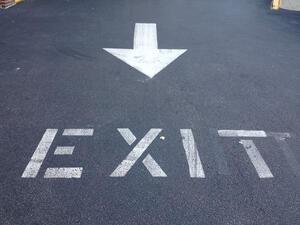Leaving In Order To Return
Though still in the month of Elul, we are approaching Rosh Hashanah, the Jewish New Year. We are leaving 5772 behind and will soon enter 5773.
Like every year, there is joy; there is sweetness; there are apples; there is honey.
But what interests me more is not the New Year, but the old one, not the sweetness but the … sadness? Perhaps sadness is too strong a word.
I am interested in the endings, the leavings.
We are a people who know goodbyes, who intrinsically understand what it is to leave—a place, a home, a position of status, a life that we know and love. Beginning with our ancestors in Egypt, continuing through the time of the Romans, Babylonians, the Inquisition, we have been forced to leave. There is a famous line in a Monty Python skit: “No one expects the Spanish Inquisition.” My reply: except for the Jews. The Jews expect the Spanish Inquisition. It is part of our conditioning. When someone refers to the Diaspora, I always wonder “which one?”
We are no strangers to leaving, and yet for a people so familiar with endings, do we as contemporary Jews really mark, really honor, that which is coming to a close?
Rather than honoring our endings, the emphasis in these weeks leading up to Rosh Hashanah is more often on repentance, searching, and teshuva (returning). I believe that in order to really return—to the Way, to one’s path, to being the authentic Self and living the authentic life—we need to give departure its due.
And that is where I think, overall, we come up short as a practicing people.
Where are our rites for endings? We have so many for beginnings: becoming a bat-mitzvah, an adult in the eyes of the Jewish community; becoming a bride; becoming a mother; graduating from college; or having a housewarming party (and maybe putting up a mezuzah).
But what about what we are leaving behind?
Last week, my mother helped me move the last of my belongings from my previous apartment to the one I now share with my boyfriend. “The main reason I’m helping you,” she said, “is because I don’t want you to leave anything behind.”
What I think she was really saying: “I don’t want you to leave me behind.”
I don’t exactly know what happened during the move, but the day ended with her in tears. It could be because I relegated her to role of dishwasher; it could be because I chose not to heed her packing advice; it could be because I was not just leaving that apartment where I spent two years as a single woman, but by my moving in with my boyfriend, on some unconscious level, she felt that I was leaving her. I don’t really know, though, because the only message she has left me in the past 10 days (yes, I am counting the days) is that she is too “heartbroken” to speak about it.
We are both heartbroken. For different reasons. For the same reason.
How sad that all of this is happening leading up to the High Holidays. Or maybe it’s not sad; it’s just necessary, par for the course.
In here lies an opportunity, and that is to LEAVE—to cut the old, outmoded (umbilical) cord, to gain some distance—and then RETURN, this time choosing how and in what ways you wish to reconnect. There is such power and possibility in leaving … Because you get to return … on different terms.
Though the New Year holds an inherent sweetness, and we think about the kind of relationships we want to build with our loved ones in the coming months, I am realizing it is okay to grieve for what we have left behind. Or to mourn being the one left behind.
I take heart from the fact that we have built into our tradition something that mitigates the loss and reconnects us to life’s sweetness. And that tradition is looking back, remembering. It is common during the month of Elul to visit the graves of loved ones as we remember and honor those who came before us, seeking inspiration to live fuller, richer lives.
We all know the power of remembering, and that is why JWA created “We Remember,” a special section of our website dedicated to recently deceased American Jewish women who made a difference. Remembering them helps to ease the pain of their leaving us—some as centenarians, others in mid-life, still others as young women just beginning to make their mark on the world.
When we wish each other Shana Tova next week, I’ll be remembering to give leaving its due while celebrating all that we have to return to.









Gabrielle, this is so beautiful and helpful.
I think Rosh Hashana is not only about moving forward, but about using our pasts to propel us forward. We take account of what we have done in the past, we confess, we evaluate, and it is from this looking back that we can decide who and what we want to be and do in the future year. So that proceeding forward requires looking back, so that you are taking with you the memory of what you are leaving behind, and is both the leaving and the taking, together, that give us the strength to grow into the new year.
Incidentally, I'm currently working on a talk that I am giving on Yom Kippur about what the "opposite" of Yom Kippur might look like. I think you are right to question whether leaving behind is actually the "opposite" of tshuva, of return. So often the things that we imagine as opposites are actually just two sides of the same coin.
In reply to <p>Gabrielle, this is so by Jessica Kirzane
I immediately think of Havdalah in connection w/exiting (Shabbat). I am known to create blessings on occasions or happenings for which there is no blessing - I shall work on this 'exit' or 'end' issue. Different than our overused "closure"...thanks for cutting the surface of such a provocative point.